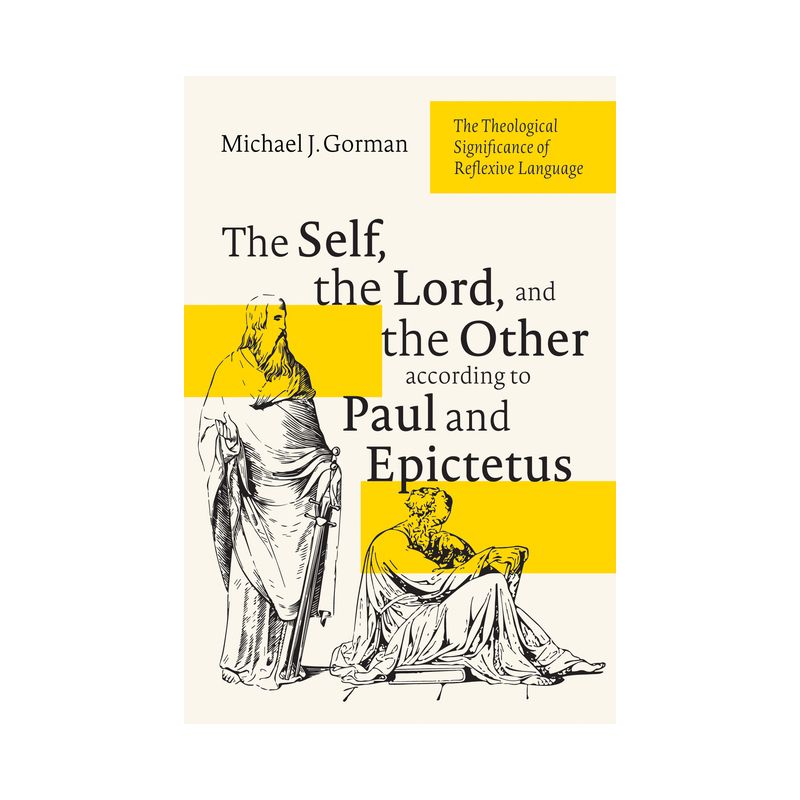Sponsored
The Self, the Lord, and the Other According to Paul and Epictetus - by Michael J Gorman
FormatHardcover
Create or manage registry
Sponsored
About this item
Highlights
- This study explores the relationship between the individual person (the self), the divine, and other people in the writings of the apostle Paul and the Roman Stoic Epictetus.
- About the Author: Michael J. Gorman holds the Raymond E. Brown Chair in Biblical Studies and Theology at St. Mary's Seminary & University in Baltimore, Maryland.
- 540 Pages
- Religion + Beliefs, Biblical Criticism & Interpretation
Description
About the Book
"This study explores the relationship between the individual person (the self), the divine, and other people in the writings of the apostle Paul and the Roman Stoic Epictetus. It does so by examining self-involving actions expressed with reflexive pronouns (myself, yourself, etc.) in various kinds of sentences: for example, "Examine yourself" and "You do not belong to yourself." After situating the topic within the fields of linguistics and ancient Greek, the study then examines the reflexive constructions in Epictetus's Discourses, showing that reflexive texts express fundamental aspects of his ethic of rational self-interest in imitation of the indwelling rational deity. Next, the investigation examines the 109 reflexive constructions in Paul, providing an exegesis of each reflexive text and then synthesizing the results. Paul's reflexive phrases are essential statements of his theology and ethics, expressing an interconnected narrative Christology, narrative apostolic identity, and narrative ethic. Most importantly, the study finds that for Epictetus, concern for others is a rational means to self-realization, whereas for Paul, concern for others is a community ethic grounded in the story of the indwelling Christ and is the antithesis of self-interest." --Book Synopsis
This study explores the relationship between the individual person (the self), the divine, and other people in the writings of the apostle Paul and the Roman Stoic Epictetus. It does so by examining self-involving actions expressed with reflexive pronouns (myself, yourself, etc.) in various kinds of sentences: for example, ""Examine yourself"" and ""You do not belong to yourself."" After situating the topic within the fields of linguistics and ancient Greek, the study then examines the reflexive constructions in Epictetus's Discourses, showing that reflexive texts express fundamental aspects of his ethic of rational self-interest in imitation of the indwelling rational deity. Next, the investigation examines the 109 reflexive constructions in Paul, providing an exegesis of each reflexive text and then synthesizing the results. Paul's reflexive phrases are essential statements of his theology and ethics, expressing an interconnected narrative Christology, narrative apostolic identity, and narrative ethic. Most importantly, the study finds that for Epictetus, concern for others is a rational means to self-realization, whereas for Paul, concern for others is a community ethic grounded in the story of the indwelling Christ and is the antithesis of self-interest.Review Quotes
"Gorman convincingly demonstrates that Paul's use of reflexive pronouns and phrases is an essential element of Paul's theological and ethical formulations. The detailed comparison of Paul's usage with that of Epictetus brings the apostle's distinctiveness into sharp focus and bears considerable theological fruit. This important contribution to Pauline studies deserves a wide readership."
--Martinus C. de Boer, Vrije Universiteit Amsterdam
"In an age of insatiable self-reference--think only of 'selfies'--Gorman returns to classic Pauline texts to retrieve what a Christian sense of self can be. By juxtaposing his reading of Paul with a reading of Epictetus, Gorman shows how the Pauline self is one that belongs in and to community and works in service against self-exaltation."
--C. Kavin Rowe, Duke Divinity School
About the Author
Michael J. Gorman holds the Raymond E. Brown Chair in Biblical Studies and Theology at St. Mary's Seminary & University in Baltimore, Maryland. He is the author of numerous books on Paul and other topics in New Testament theology. This book is a thoroughly updated version of his previously unpublished PhD dissertation.Additional product information and recommendations
Sponsored
Similar items
Loading, please wait...
Your views
Loading, please wait...
More to consider
Loading, please wait...
Featured products
Loading, please wait...
